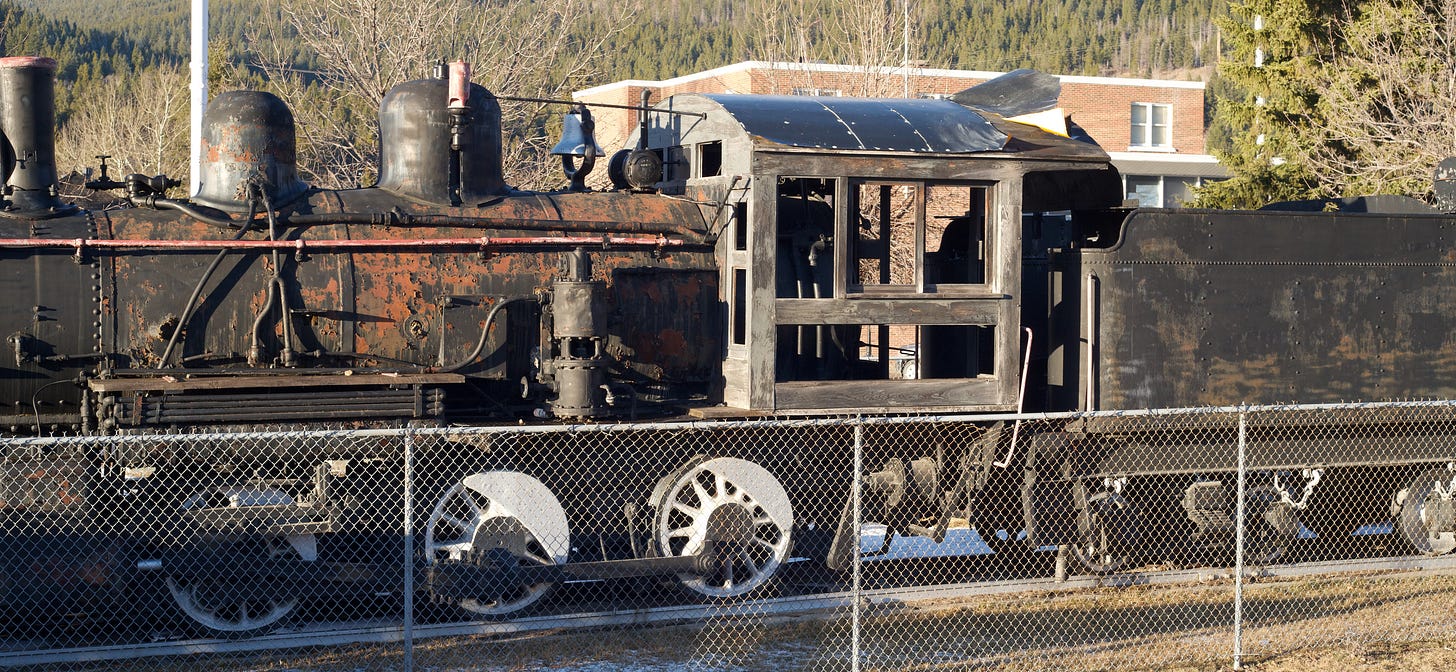The danger is now clear and present
Seventy-two percent of 2720 Crowsnest Pass voters marched proudly into the black hole of their past, on a sales pitch of lower taxes and high-paying jobs.
Crowsnest Pass Express to Nowhere
As I did my turn last evening scrutineering for the No campaign, an assistant deputy returning officer, name of Wes, looked up with his fist full of green ballots. “I hate “No’s”, he declared. Asked what he meant, Wes responded, “Because they forget all that the mines gave us.” He then continued his solemn public duty, sorting ballots into a big pile of Yes’s and a tiny stack of No’s.
Yes:1951. No: 769. And that is the story of the Crowsnest Pass referendum.
It’s a story of a population captured by nostalgia for a mythical past, with a bit of modern malfeasance thrown in — from covert meetings and secret deals at town hall to the misbehaviour of an elderly ballot counter.
The surreal part of the story is that Grassy Mountain is not even located in Crowsnest Pass; it is in the neighbouring Municipal District of Ranchland where 100 percent of the council and population are opposed.
Ostensibly, the issue decided by a margin of 1182 votes was whether the municipal council should continue spending taxpayer funds on behalf of a foreign coal speculator. This same speculator, Gina Rinehart, was denied regulator permission in 2021 to re-start the long-abandoned coal mine at Grassy Mountain.
The larger issue now is whether a small, insular population of self-described economic left-behinds should provide political cover to the provincial government for the further destruction of the Alberta Rocky Mountains.
This should be a choice for all Albertans, particularly those south from Calgary and east to Medicine Hat. The Eastern Slopes communities, the downstream First Nations, the potato growers and the frozen french-fry processors all depend on a an already diminishing supply of water that originates in these damaged mountains. A clan of 1951 yes voters have shown themselves to be selfish and unworthy custodians of those headwaters. It’s time for wider a trusteeship by all Alberta citizens.
If Gina Rinehart has her way with Grassy Mountain, there will be substantial and permanent loss of watershed productivity and diversions of clean water from the Crowsnest and Oldman Rivers. There would be cumulative selenium pollution that would eventually poison municipal drinking water (as it has in Sparwood and Fernie, BC) and destroy the food production and processing industries strung out along the river system. There will also be additional poisoning of agricultural soil by wind-borne carcinogens, something Alberta’s own scientists have measured from the mines across the boundary in British Columbia but are not allowed to talk about.
So, tectonically, the battleground has now shifted. It is no longer confined to Crowsnest Pass; it is now all of Alberta. This will be a test of whether the corrupting influence of a distant coal speculator can can capture the will and politics of a whole province the way it did so successfully in Crowsnest Pass.
As High River Mayor Craig Snodgrass wrote to the premier, even as the Crowsnest ballots were still being cast:
“Premier Smith, if what you speak is the truth and you truly do take pride in this province and everything it stands for, then for all the pioneers and farmers, the many First Nations, Metis and Inuit peoples, who have lived on and cared for these lands for generations, and for the rest of all Albertans and municipalities located within the Eastern Slopes of the Rocky Mountains, who will be deeply affected by any decisions regarding coal mining in our region, we deserve to have a say in these matters.”



